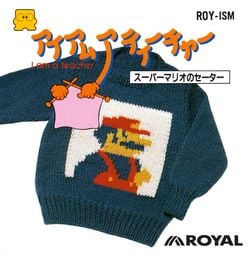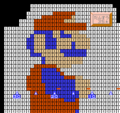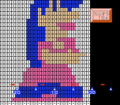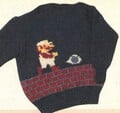I am a teacher: Super Mario Sweater
The title of this article is from the English Super Mario Bros. Encyclopedia which reportedly sourced some names from fan wikis. If a higher-priority source is found, then the current reference should be removed and the title moved to the higher-priority name, if applicable.
| I am a teacher: Super Mario Sweater | |||
|---|---|---|---|

| |||
| Developer | Nintendo | ||
| Publisher | Royal Kougyou | ||
| Platform(s) | Family Computer Disk System | ||
| Release date | FDS: Template:Release[?] | ||
| Genre | Miscellaneous | ||
| Rating(s) |
| ||
| Mode(s) | Single player | ||
| Input | NES:
| ||
I am a teacher: Super Mario Sweater is a knitting pattern-designing game released for the Family Computer Disk System on August 27, 1986, only in Japan. Players would input their measurement sizes and design sweaters, adding pictures of famous characters such as Mario, Luigi, Peach, and Bowser in the process. It was devised by Royal Industries Co. Ltd., a Japanese appliance and sewing machine company. It is the first of two textile games of the Super Mario franchise, the other being Mario Family on the Game Boy Color.
Royal Industries Co. Ltd. realized that it could profit from a sweater-design program, which led to the development of this game. The company eventually made a real-life version of the game and sold it for 2,900¥ (about $24 in United States Dollars).[1]
One month after the release of I am a teacher: Super Mario Sweater, a companion game titled I am a teacher: Teami no Kiso ("I am a teacher: The Basics of Hand-Knitting") was released, which does not feature any Super Mario characters.[2] The game serves primarily as a knitting tutorial, a feature entirely absent from its predecessor.
Gallery
Names in other languages
| Language | Name | Meaning | Notes |
|---|---|---|---|
| Japanese | アイアムアティーチャー スーパーマリオのセーター[?] Ai amu a tīchā: Sūpā Mario no Sētā |
I am a teacher: Super Mario's Sweater | |
| Italian | I Am A Teacher: Super Mario Sweater[3] | - |
References
 This article is a stub. You can help the Super Mario Wiki by expanding it.
This article is a stub. You can help the Super Mario Wiki by expanding it.





